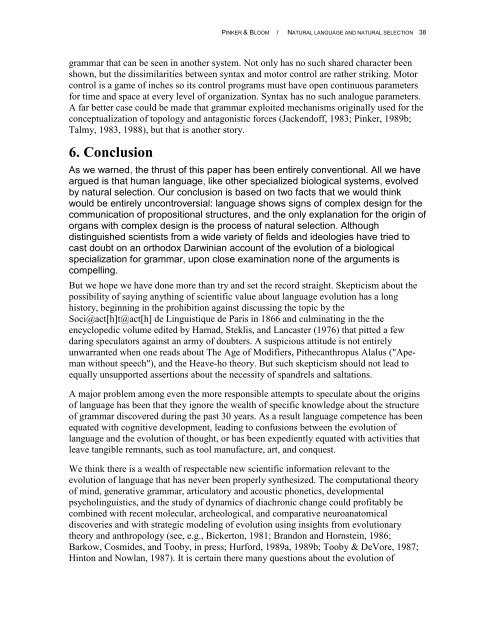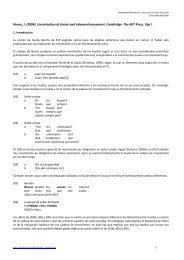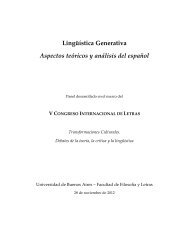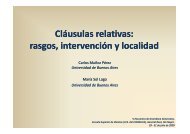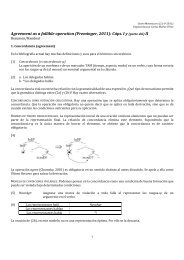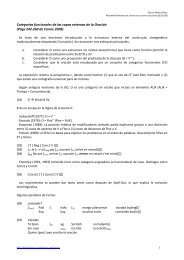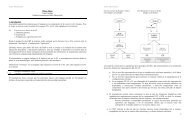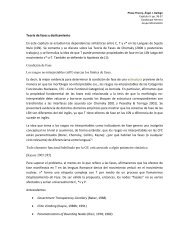Pinker - Bloom - NATURAL LANGUAGE AND NATURAL SELECTION
Pinker - Bloom - NATURAL LANGUAGE AND NATURAL SELECTION
Pinker - Bloom - NATURAL LANGUAGE AND NATURAL SELECTION
Create successful ePaper yourself
Turn your PDF publications into a flip-book with our unique Google optimized e-Paper software.
PINKER & BLOOM / <strong>NATURAL</strong> <strong>LANGUAGE</strong> <strong>AND</strong> <strong>NATURAL</strong> <strong>SELECTION</strong> 38<br />
grammar that can be seen in another system. Not only has no such shared character been<br />
shown, but the dissimilarities between syntax and motor control are rather striking. Motor<br />
control is a game of inches so its control programs must have open continuous parameters<br />
for time and space at every level of organization. Syntax has no such analogue parameters.<br />
A far better case could be made that grammar exploited mechanisms originally used for the<br />
conceptualization of topology and antagonistic forces (Jackendoff, 1983; <strong>Pinker</strong>, 1989b;<br />
Talmy, 1983, 1988), but that is another story.<br />
6. Conclusion<br />
As we warned, the thrust of this paper has been entirely conventional. All we have<br />
argued is that human language, like other specialized biological systems, evolved<br />
by natural selection. Our conclusion is based on two facts that we would think<br />
would be entirely uncontroversial: language shows signs of complex design for the<br />
communication of propositional structures, and the only explanation for the origin of<br />
organs with complex design is the process of natural selection. Although<br />
distinguished scientists from a wide variety of fields and ideologies have tried to<br />
cast doubt on an orthodox Darwinian account of the evolution of a biological<br />
specialization for grammar, upon close examination none of the arguments is<br />
compelling.<br />
But we hope we have done more than try and set the record straight. Skepticism about the<br />
possibility of saying anything of scientific value about language evolution has a long<br />
history, beginning in the prohibition against discussing the topic by the<br />
Soci@act[h]t@act[h] de Linguistique de Paris in 1866 and culminating in the the<br />
encyclopedic volume edited by Harnad, Steklis, and Lancaster (1976) that pitted a few<br />
daring speculators against an army of doubters. A suspicious attitude is not entirely<br />
unwarranted when one reads about The Age of Modifiers, Pithecanthropus Alalus ("Apeman<br />
without speech"), and the Heave-ho theory. But such skepticism should not lead to<br />
equally unsupported assertions about the necessity of spandrels and saltations.<br />
A major problem among even the more responsible attempts to speculate about the origins<br />
of language has been that they ignore the wealth of specific knowledge about the structure<br />
of grammar discovered during the past 30 years. As a result language competence has been<br />
equated with cognitive development, leading to confusions between the evolution of<br />
language and the evolution of thought, or has been expediently equated with activities that<br />
leave tangible remnants, such as tool manufacture, art, and conquest.<br />
We think there is a wealth of respectable new scientific information relevant to the<br />
evolution of language that has never been properly synthesized. The computational theory<br />
of mind, generative grammar, articulatory and acoustic phonetics, developmental<br />
psycholinguistics, and the study of dynamics of diachronic change could profitably be<br />
combined with recent molecular, archeological, and comparative neuroanatomical<br />
discoveries and with strategic modeling of evolution using insights from evolutionary<br />
theory and anthropology (see, e.g., Bickerton, 1981; Brandon and Hornstein, 1986;<br />
Barkow, Cosmides, and Tooby, in press; Hurford, 1989a, 1989b; Tooby & DeVore, 1987;<br />
Hinton and Nowlan, 1987). It is certain there many questions about the evolution of


